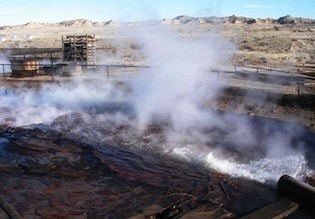The U.S. EPA is poised to enact the first ever rules on hydraulic fracturing (fracking) with a proposal that would allow the agency to regulate the practice under the Clean Air Act. The Clean Air route was chosen by the agency, as the U.S. Congress prohibited their attempts to regulate the practice of fracking under the Clean Water Act in 2005.
From Raw Story:
The new EPA proposal would limit emissions released during many stages of natural gas production and development, but explicitly targets the volatile organic compounds released in large quantities when wells are fracked. Drillers would have to use equipment that captures these gases, reducing emissions by nearly 95 percent, the EPA said.
The EPA contends that the measure would actually be a moneymaker for drilling companies. Though it might compel them to invest in new equipment, this equipment would allow them to capture methane gas currently lost in the drilling process, which they could then sell.
The EPA proposal is the result of a successful 2009 lawsuit brought against the agency by WildEarth Guardians and another advocacy group alleging that the agency had not updated air-quality rules as required. The EPA is supposed to review such rules at least every eight years, but in some cases had not done so for 10 years or more.
Despite the EPA’s claims that the tighter standards would actually increase the income of gas drillers, the industry was quick to speak out against the proposed rule changes. The Marcellus Shale Coalition issued the following response on their website:
While we understand that EPA is required by law to periodically evaluate current standards, this sweeping set of potentially unworkable regulations represents an overreach that could, ironically, undercut the production of American natural gas, an abundant energy resource that is critical to strengthening our nation’s air quality.
According to the EPA, the new rules would result in the following emission reductions every year:
Methane – 3.4 million tons, which is equal to 65 million metric tons of carbon dioxide equivalent (CO2e), a reduction of about 26 percent.
Air Toxics –38,000 tons, a reduction of nearly 30 percent.
Once the EPA sets a date for implementation, the gas industry will have 60 days to submit any complaints or input on the new rules. While the date is not currently set, the American Petroleum Institute has already asked the EPA to delay implementation until at least August 2012.
Subscribe to our newsletter
Stay up to date with DeSmog news and alerts







